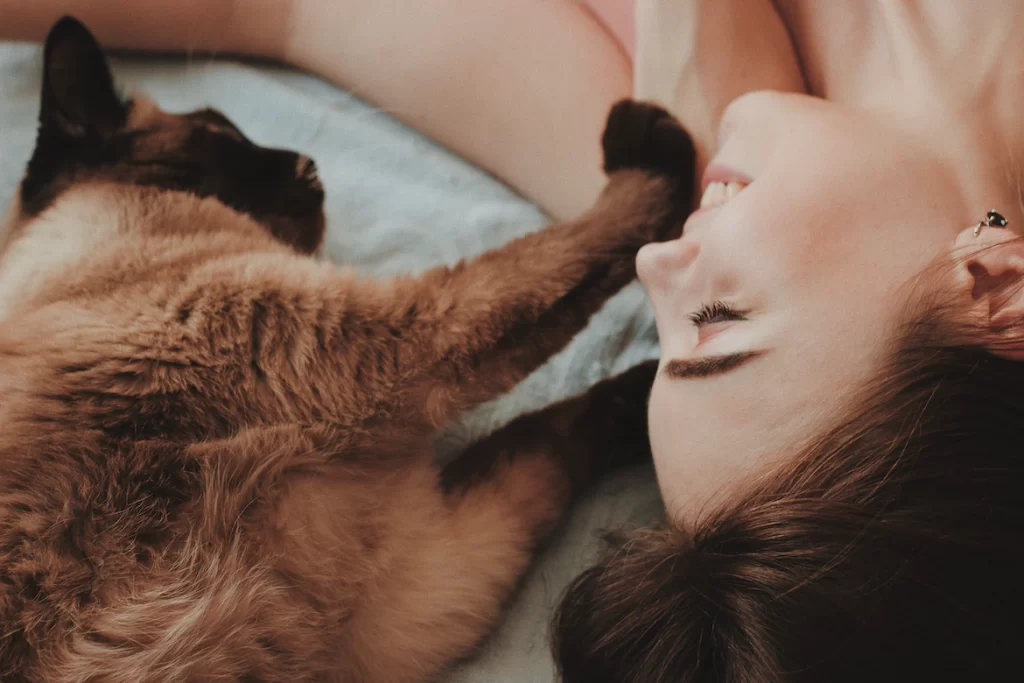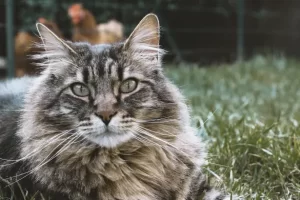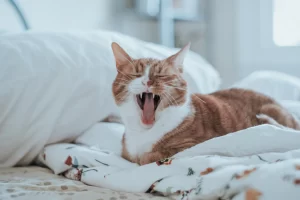Last updated on February 13th, 2023 at 02:54 am

Even though cats have been a part of human life for countless years, there is a lot we do not understand about them. How they sit, purr, move about, get back home, and more remains speculation. As a pet owner with longer or shoulder-length hair, you may have experienced your cat biting your hair. Sometimes our furry friends may bite our hair for multiple reasons, ranging from mild to extreme, like various medical conditions depending on your cat’s situation. We will discuss the causes of their hair-biting behavior and provide a few ways to stop it. Here are some reasons why your cat bites your hair:
#1. The taste is appealing to your cat
Certain hair products could have an enticing taste for your furry friend. It is best to switch to a different scent / unscented kind if you’ve just started using another hair product that your cat likes on your hair. If your cat’s constant hair-biting is driving you crazy, especially after washing your hair or spraying it, this may be the reason for the hair biting. At times food scents may stick on your hair when cooking, and this may entice your cat, especially if it smells of their favorite meat; therefore, they will start biting your hair in an attempt to find food while also enjoying the flavor.
#2. They have hyperthyroidism
The abrupt development of biting on human hair indicates hyperthyroidism, which refers to cats’ highly active thyroid glands. This ailment is more prevalent in older cats, especially those between 12 and 13 years old. Make sure to schedule a visit with your vet if your senior cat is displaying this behavior in addition to abrupt weight loss and an insatiable appetite.
#3. Your cat is trying to express that they love you
Allogrooming, also known as cat grooming, is a method for cats to bond and express their affection. Cats frequently do it to their grooming partners’ heads and necks; therefore, it is highly likely that their human buddies will also experience this.
#4. The cat has pica
Pica is the impulse for a cat to consume things that are not edible, like paper, hair binders, plastic, cords, strings, and human hair. It can be risky since it might result in intestinal blockage. Siamese and other oriental breeds are genetically prone to having pica compared to other breeds. Reasons your cat may develop pica:
- Medical conditions like diabetes or cat leukemia
- Dietary deficiency
- They want to gain your attention
- Anxiety and stress from lacking sufficient exercise
- Early weaning
- Genetic disposition mainly in Siamese and other oriental breeds
- An ailment
- Boredom
#5. It is stress relieving
Biting your hair may help reassure your cat of the link you share, which will help calm its anxiety if it feels frightened, scared, or anxious. You can relax and delight in the affection your cat gives you if this behavior doesn’t upset you and is only done sometimes. If it continues or becomes more regular, consider finding out why your cat may be under stress from reasons such as a newborn child, a sudden relocation, or the loss of another pet.
#6. They are being playful
If it occurs during the day, your cat may play with you if it is biting and chewing on your hair. For example, when you’re lying down, your cat will have access to your head, increasing the likelihood of this happening. Your furry friend may consider it an exciting toy if you have long hair. Your hair becomes an even better play toy as you shake your head when it is attacking.
#7. Your kitten may be missing their mum
Kneading habits and attempts to suck from blankets, fingers, or hair are common in kittens that are early weaned or abandoned. Kittens should remain with their mother for at least twelve weeks before being separated. It may appear that your cat is attempting to nurse, which is precisely what the kitten is doing if it didn’t get enough weaning.
#8. The cat has obsessive-compulsive disorders (OCD)
Cats can experience obsessive-compulsive disorders, much like people do. OCD may arise as a coping technique for stressful situations or because the cat enjoys licking and chewing. The typical symptoms of OCD include constant grooming, licking, biting, and tail-chasing. Therefore, your cat might bite and chew your hair to the point where you develop a bald area. OCD may arise as a coping technique for challenging situations or because the cat enjoys biting and chewing. Your veterinarian should examine the situation before the cat harms you or itself.
#9. Your kitty enjoys doing it
A healthy cat may occasionally engage in hair-biting behavior just out of amusement. A content cat will get a rush of happy endorphins and want to keep doing it. Your cat might savor the aroma or flavor of your freshly shampooed or bathed hair if you just took a shower or washed it. In addition to loving to bite, kittens tend to bite anything they see when they are teething to ease the discomfort of the newly emerging teeth. Therefore, one of the signs that your kitten is developing adult teeth could be hair biting.
#10. To draw your attention
Your cat may be trying to get your attention by biting, licking, or hair pulling, among other related actions. They might be bored, or they have missed you all day long, and hair biting is their way to make you focus on them. Spend more time with them if you feel their behavior is to make you attentive to them.
Ways To Stop Your Cat From Biting Your Hair
#1. Start by identifying the cause
Hair biting could be considered normal behavior for your cat if it has consistently bitten a tiny portion of your hair. It can express love or how your cat recognizes you as its owner. There is no need to panic, even though this conduct may bother you, and you may want to take action to stop it. From the moment a kitten is born, grooming plays a significant role in its social and emotional development. Your cat can be marking you as a member of its territory or its pack by showering you with its scent. Finding the cause will help you quickly stop the hair-biting traits. Cats frequently start biting when stressed, such as after relocating or when another pet has been brought into the home.
Find out whether your cat’s recent significant life events may have triggered its hair biting. It is crucial to refrain from yelling at your cat or punishing them physically when trying to get them to stop licking or biting its hair. Your cat will experience more stress as a result of such actions. Remember, not everything that stresses you out may also stress a cat. To identify the source of the tension, try to picture yourself in your cat’s position.
#2. Get away from the cat
Whenever you continue to sit in the same spot and touch or converse with your cat as it bites or licks on your hair, you are teaching it that this is a good habit. You should pull your hair back, get up, and walk away from the cat instead. You can hide from your cat by concealing your head under the covers or try separating yourself from your cat with a cushion when in bed. When discouraging the conduct, be persistent. This method only works if you are fast to react and can stop your cat from biting your hair as soon as it starts. Your cat will become confused if you give inconsistent replies, such as permitting them to bite your hair occasionally but not others. Your cat won’t grasp what you mean for several weeks or even months, but gradually it will realize that licking or biting is not okay. You can use treats to enforce this by rewarding them every time they do not bite your hair and failing to give them treats every time they do.
#3. Change your hair products
Avoid using certain hair products and try something different if the behavior of licking or biting your hair always occurs after you use a particular scented hairspray or shampoo. Go for products that do not have a scent, or find one your cat hates. Try using a hair product with a citrus flavor to deter your cat since cats generally dislike items with citrus scents.
#4. Assist your kitty in coping with stressors
When stress appears to be the problem, figure out how to help your cat deal with the scenarios that upset it. For instance, creating a safe zone filled with familiar objects can reduce the stress of moving into a new house, and spending more time together can lessen the anxiety associated with welcoming a new pet or child. You can quickly eliminate your furry friend’s stressors in instances where they are afraid of a neighboring cat by drawing your curtains on windows to avoid hair biting. Ensure you introduce new pets gradually and that your cat isn’t being neglected to prevent this behavior. Additionally, you can spend money on cat pheromone items, such as sprays, diffusers, collars, and wipes. These substances assist your anxious cat deal with situations that are out of her or your control by acting like the pheromones released by happy cats.
#5. Consulting a veterinarian
The behavior may be persistent and necessitate a trip to the vet if it persists or if you cannot divert your cat’s attention from its hair biting or chewing with another activity. Mood-altering medications like Prozac/clomipramine may be able to stop obsessive behavior in a few severe cases. A cat exhibiting this behavior later in life may be hypothyroidism. A veterinarian must diagnose and treat this condition, affecting 30 percent of cats ten years and above. This conduct should lessen with treatment; your kitty will continue with this behavior if not managed. Visiting a vet can also help identify illnesses, kidney issues, or underlying pain causing their behavior, especially if it is new, and help you deal with them effectively.
#6. Distract your kitty
Giving your cat something else to chew on, such as toys, snacks, or cat grass, is one of the most remarkable ways to persuade it to stop biting your hair. Additional playtime with you can give extra mental and physical stimulation, both excellent free distractions. Exercising 5 to 10 minutes daily could help your cat stop acting out by lowering anxiety. You can use a feather wand or a laser light to get your cat active. Although treats can be a worthwhile diversion, be careful not to overfeed your cat since weight gain and other health issues might follow. Please check that the toys you give your feline are secure and will not put it in danger of choking.
#7. Please give them a safe space
Find another way for your cat to relax if you believe it is frightened or nervous and is biting or eating your hair as a result. Getting a cat bed your kitty can rub or a blanket that warms itself up in one of its essential locations can help immensely. Alternatively, you can provide them with heaps of soothing petting to help them feel calm.
Often, cats biting your hair is normal and not an issue of much concern. There are several reasons for such behavior, such as showing affection, being playful, loving the taste, and more. However, there may be extreme reasons like hyperthyroidism, pica, and other medical conditions. It is vital to make an appointment with your veterinarian to have your pet thoroughly examined if you’ve seen any other strange actions in your cat, as hair biting has increased in frequency and intensity. There are also other ways to stop such behaviors, as they can harm you and your cat, which will work with time. We hope this article will help you solve your cat hair-biting behaviors.
Conclusion
Often, cats biting your hair is normal and not an issue of much concern. There are several reasons for such behavior, such as showing affection, being playful, loving the taste, and more. However, there may be extreme reasons like hyperthyroidism, pica, and other medical conditions. It is vital to make an appointment with your veterinarian to have your pet thoroughly examined if you’ve seen any other strange actions in your cat, as hair biting has increased in frequency and intensity. There are also other ways to stop such behaviors, as they can harm you and your cat, which will work with time. We hope this article will help you solve your cat hair-biting behaviors.


